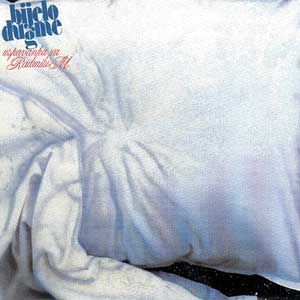- Uspavanka za Radmilu M.
Infobox Album | Name = Uspavanka za Radmilu M
Type =Album
Artist =Bijelo dugme

Released =February 21 ,1983
Recorded = Studio RTV,Skopje &Britannia Row Studios ,London .
January 1983
Genre = Rock New Wave
Length = 32:33
Label =Jugoton
Producer = Gajo VučićevićGoran Bregović
Reviews =
Last album = "Singl ploče (1976-1980)"
(1982)
This album = "Uspavanka za Radmilu M."
(1983)
Next album = "Sanjao sam noćas da te nemam (Velike rock balade) "
(1984) |"Uspavanka za Radmilu M." is a sixth studio album by the Yugoslav rock group
Bijelo dugme .Recorded in
Skopje , Macedonia and mixed atLondon 'sBritannia Row Studios it was the band's sixth studio release and by far their least successful one. Both commercially and critically, the album failed to hit the target, and in the end only managed to deepen the creative crisis and toxic internal relations affecting the band at the time.Coming off their new wave-inspired "
Doživjeti stotu " album, which was a radical departure from Bijelo dugme's original folkishhard rock style, "Uspavanka za Radmilu M." was to be their chance for redemption as they decided to make it a lot less new wave oriented. And though it had a considerably more favourable initial reception than its predecessor, most still found it to be unfocused and incoherent.Tracks like the opening "Polubauk polukruži poluevropom" and the
Lou Reed esque "Ovaj ples dame biraju", both featuring barely intelligible lyrics, were in many circles taken as the defining proof thatGoran Bregović was fast becoming a spent author with no new credible ideas. "U vrijeme otkazanih letova" fuses lyrics featuring oriental motifs with the '80snew romantic sound (parts of the track sound essentially identical toDuran Duran 's "Girls on Film "). The band only somewhat sounds like the famous Dugme of old on "Ako možeš zaboravi" (by far the best known song off the album) and "Zašto me ne podnosi tvoj tata". The album is rounded off by "Ne plači", followed by the instrumental title track.Still, Bregović managed to get the public's attention by having Željko Bebek sing "Kosovska" in Albanian, which opened the door for Dugme to stage a concert in
Priština - something that most other Yugoslav bands at the time stayed away from due to fears of crowd trouble. The track also featuresVlatko Stefanovski on guitar.During its making, Bregović conceptulized "Uspavanka za Radmilu M." as the band's farewell record. He later said: "When we were working on Uspavanka, we approached it with the intent of making it our final album. Some pieces came together that made it clear to us that it is time to go. I planned on making our Belgrade concert at Sajmiste on April 24, 1983 our last, but the entire atmosphere was so good, that we had a change of heart." [Stevović, Nenad, "Kad bi' bio bijelo dugme", p.86, Klub Kulture, Kragujevac, 2005]
And while "Uspavanka..." turned out not to be Bijelo dugme's swan song, it was the end of an era in other ways.
It was their last album featuring
Željko Bebek , founding member who spent the previous decade as the group's lead singer. He officially left in April1984 to pursue a solo career, following a long period of quiet and open feuding with Bregović, mostly over revenue sharing.It was also the last studio album Bijelo dugme released for
Jugoton , as the record label wasn't happy with the band's recent shift towards new wave, which they thought perciptated a drop in sales. On the other hand, Bregović thought the lack of a proper marketing effort by the label contributed to band's deteriorating popularity.Track listing
#"Polubauk polukruži poluevropom" (Bregović) - 3:57
#"Drugovi i drugarice" (Bregović) - 3:33
#"Kosovska" (Zija Beriša/Agron Beriša/Špand Ahmeti/Bregović) - 3:34
#"U vrijeme otkazanih letova" (Bregović) - 3:40
#"Zašto me ne podnosi tvoj tata" (Bregović) -3:21
#"Ako možeš zaboravi" (Bregović) - 4:58
#"Ovaj ples dame biraju" (Bregović) - 5:11
#"Ne plači" (Bregović) 3:54
#"Uspavanka za Radmilu M." (Bregović) - 2:25*All lyrics written by Goran Bregović apart from "Kosovska" which was written by Zija Beriša, Agron Beriša, Špand Ahmeti in collaboration with Goran Bregović.
Line-up
*
Goran Bregović - guitar
*Željko Bebek - vocals
*Zoran Redžić - bass guitar
*Ipe Ivandić - drums
*Vlado Pravdić - keyboardsReferences
Wikimedia Foundation. 2010.
